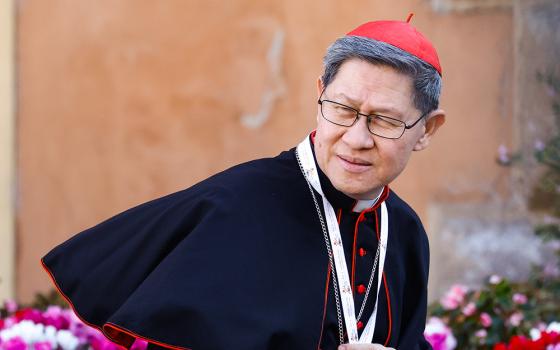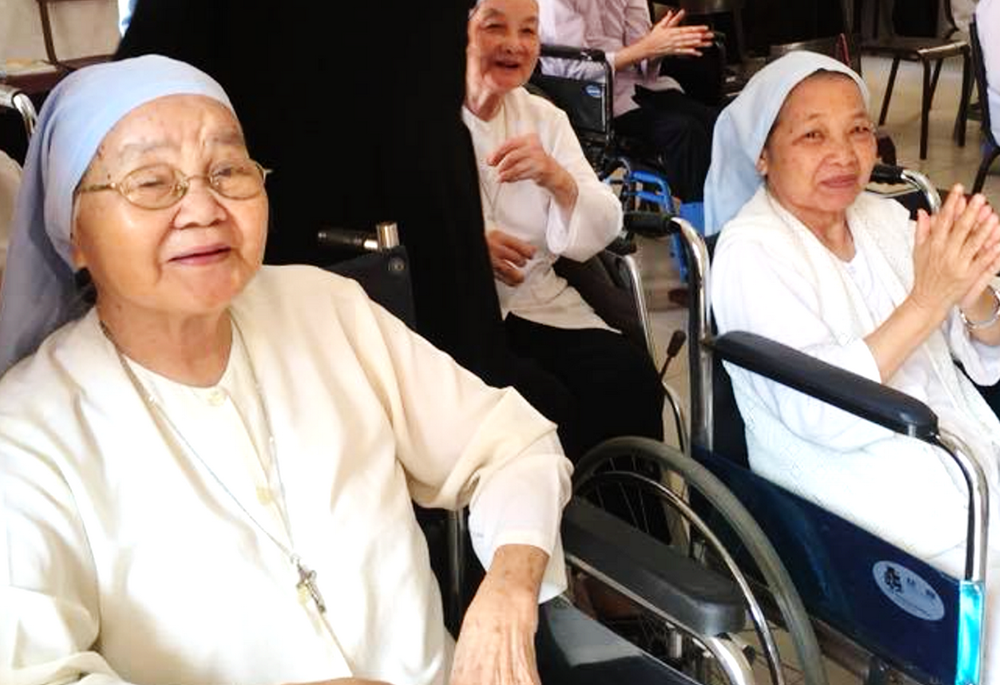
St. Paul de Chartres Srs. Benedictine Pham Dieu Canh, left, and Anna Nguyen Thi Tuy, right, who fled to southern Vietnam in 1954, are at a house for older nuns in Hue on July 8, 2024. (GSR photo)
Editor's Note: This is Part Two of a two-part series. Read Part One here.
After fleeing to southern Vietnam in 1954, congregations of women religious dedicated themselves to serving their local communities during wartime challenges, and later worked to restore their communities in the north.
St. Paul de Chartres Sr. Benedictine Pham Dieu Canh said it was a crucial opportunity for northern orders to expand their pastoral activities in the southern dioceses, responding to urgent needs for pastoral care among local Catholic communities.
"Many of us were young, enabling us to energetically integrate into our new surroundings and serve the needy despite numerous challenges," Canh noted.
They worked diligently to establish convents and other facilities to sustain their missions, striving to support themselves during those years.
Canh recounted that after some 200 St. Paul de Chartres sisters gathered in Da Nang, they were invited to address the educational, social service, health care and pastoral needs of northern migrants and local Catholics in what is today the central dioceses of Da Nang, Hue, Quy Nhon, Nha Trang, Ban Me Thuot and Kontum.
Their efforts also extended to caring for victims of the Vietnam War (1954-1975). These dioceses witnessed intense battles between communist forces and American and South Vietnamese troops, resulting in widespread displacement and the loss of homes and loved ones for many.
The nun, who served at schools, hospitals, orphanages and a major seminary in Da Nang and Hue for decades, emphasized the sisters' crucial role in helping local people rebuild their lives after the bloody war.
They furnished essential education, health care and vocational training for annual disaster victims and minority groups to enhance their physical and spiritual well-being.
Canh, who retired in 2019, stated that through their perseverance and dedication, the congregation flourished, with Da Nang province established in 1960 as a hub for growth and nurturing of new vocations.
"Just a few months later, we welcomed the first 50 novices from the dioceses of Ban Me Thuot, Da Nang, Kontum and Nha Trang," she said, adding that in the years that followed, the number of new members steadily increased.
The octogenarian nun said the sisters' commitment to rebuilding their old communities in the north was evident after the government eased travel and religious restrictions in the early 1990s.
Canh, now using a wheelchair due to her age, made her first visit back to the Hanoi communities in 1991, following the merger of the Hanoi province into the Da Nang province in 1990. At that time, the Hanoi province housed just a few dozen nuns and novices in severely deteriorated convents.
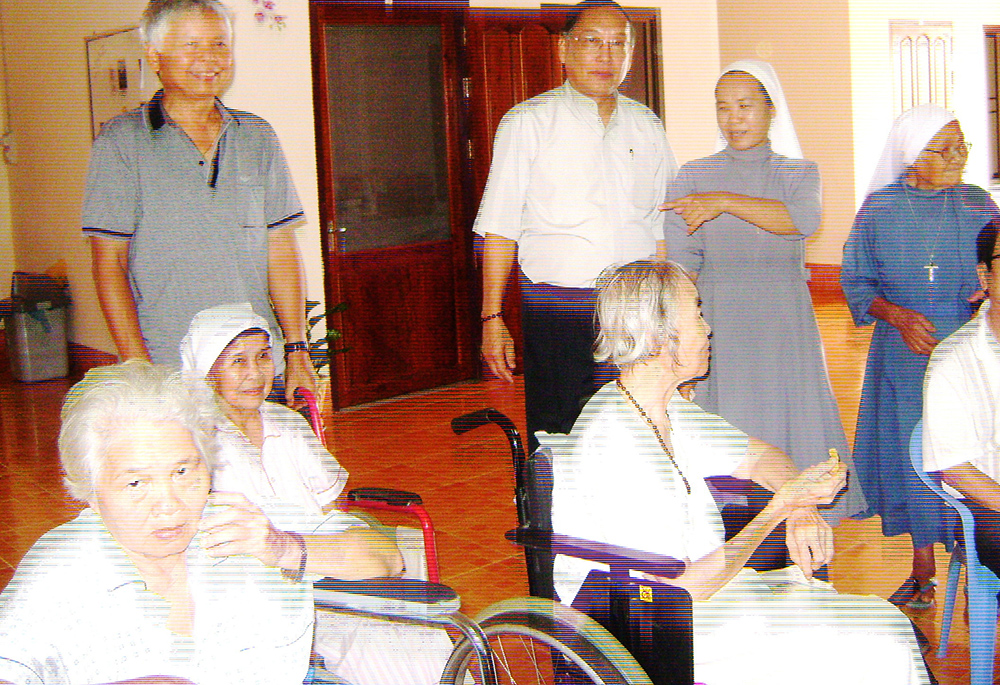
Two priests visit older nuns from the Hanoi province of Sisters of St. Paul de Chartres at their house in Hanoi, on Nov. 6, 2020. (GSR photo)
In the subsequent years, she said, the number of nuns and novices transferred to Da Nang for spiritual training gradually increased. The efforts to rebuild and strengthen their northern communities were driven by the dedication and resilience of the sisters, who sought to reinstate their mission and provide much-needed support to their fellow nuns and the local Catholic communities.
St. Paul de Chartres Sr. Ursuline Pham Thanh Khue, head of the eight-member community in Quang Nam province, reported that in 2010, Archbishop Joseph Ngo Quang Kiet of Hanoi officially reinstated the Hanoi province with 90 members after over half a century of dormancy. He called upon sisters from other areas to aid in restoring the province, whose first members arrived in Hanoi in 1883.
Khue mentioned that sisters from Da Nang were assigned annually to assist in personnel training in Hanoi. One of them, 85-year-old Sr. Saint Jean Tran Thi Anh, a former provincial superior of Da Nang, has headed the Hanoi province since 2010.
The Da Nang sisters have provided financial assistance to northern communities for reconstructing novitiates, convents and chapels to meet growing needs and accommodate new vocations. They offer scholarships and accommodation to sisters pursuing higher education within the country and sponsor sisters for overseas study.
Advertisement
Additionally, they have helped establish shelters for orphans and the elderly and boarding facilities for ethnic minority students in remote areas. This support has been crucial in meeting the spiritual and practical needs of these communities, ensuring the continuation and growth of their missions.
Khue, an expert in church history, was one of 78 orphans brought to Da Nang by the sisters in 1954. Inspired by the sisters' exemplary service, she and 27 other orphans chose to join the congregation.
She noted that the Hanoi province numbers over 400 members working in nine northern dioceses of Bac Ninh, Bui Chu, Lang Son Cao Bang, Hai Phong, Hanoi, Hung Hoa, Phat Diem, Thai Binh and Thanh Hoa.
The septuagenarian nun said that as of 2020, the St. Paul de Chartres provinces of Hanoi, Da Nang, My Tho and Saigon collectively had 1,434 sisters serving across 24 dioceses in Vietnam. They also maintain nine other communities in Australia, France, Hong Kong, South Africa and Taiwan.
"This extensive network reflects our dedication to our mission and the widespread impact of our service," she noted.
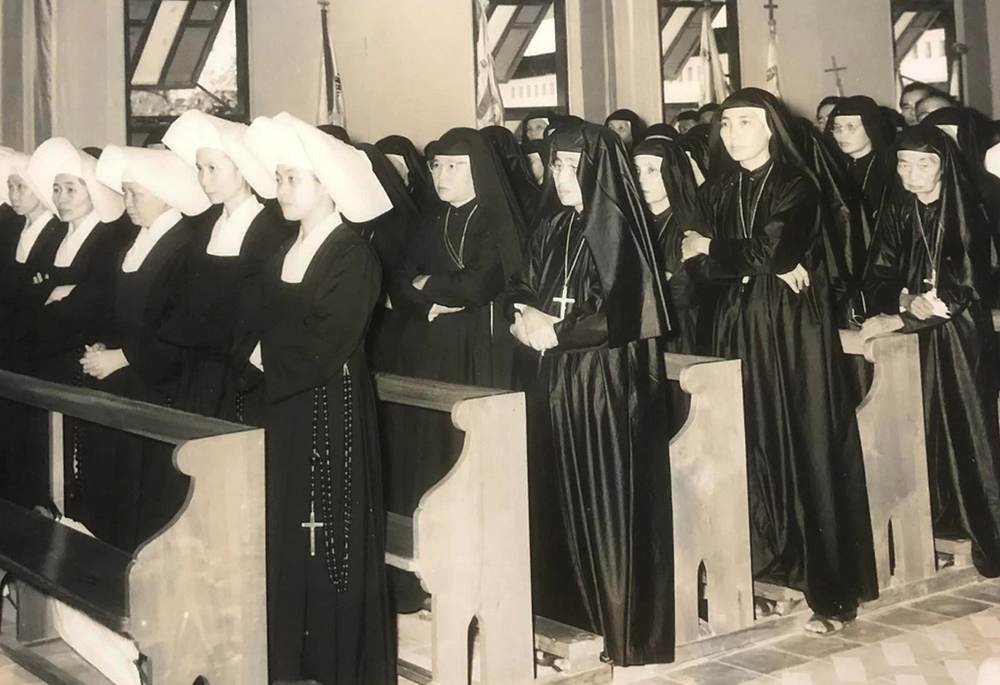
Lovers of the Holy Cross of Vinh nuns attended Holy Mass in Nha Trang in 1957 after fleeing their convent in Quang Binh province in 1954. (Courtesy of Lovers of the Holy Cross of Vinh)
Lovers of the Holy Cross (or LHC) of Vinh Sr. Anna Truong Hoai Anh highlighted that the exodus also facilitated the spread of missions and spiritual direction for her congregation in southern Vietnam and even abroad later.
Anh said some 1,000 Lovers of the Holy Cross sisters from various dioceses of Bac Ninh, Bui Chu, Hanoi, Hai Phong, Thai Binh, Phat Diem, Thanh Hoa and Vinh left for the south during the 1954 exodus. This movement led to nine new congregations in the dioceses of Saigon, Da Lat, Nha Trang and Xuan Loc.
The Lovers of the Holy Cross congregations flourished under the jurisdiction of the dioceses where they are based, enjoying independence from one another. Local church statistics indicated that as of 2021, the Southeast Asian country was home to 24 LHC congregations, comprising 9,298 professed nuns, 618 novices, 365 postulants and 938 aspirants.
Anh, who studied dogmatic theology in Rome from 2013-2017, highlighted the significant contributions of southern religious orders in restoring their native communities in recent decades.
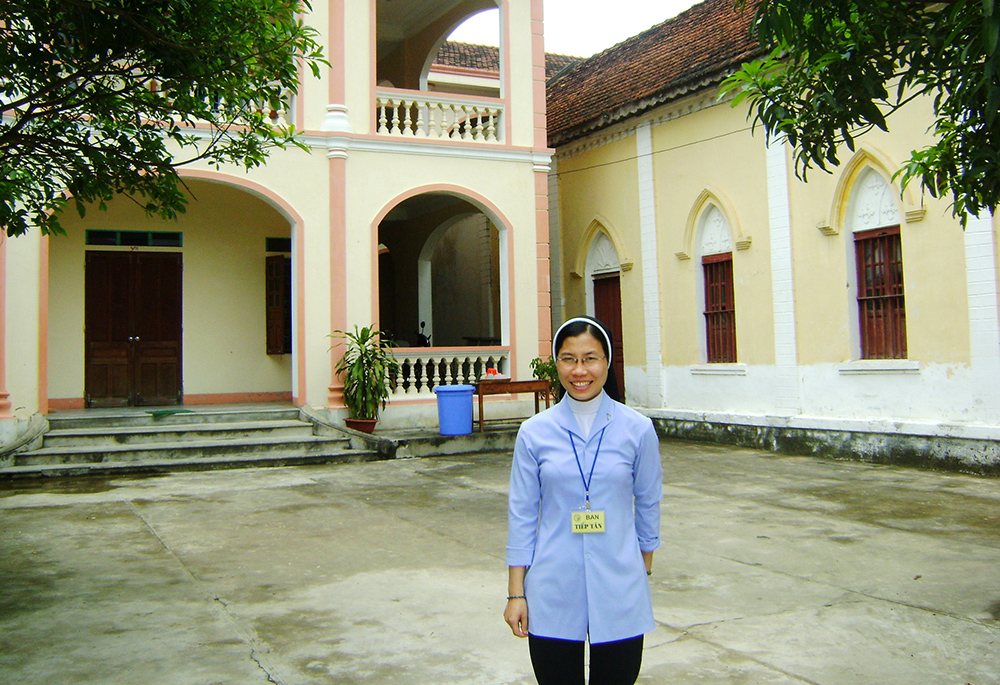
Lovers of the Holy Cross of Vinh Sr. Anna Truong Hoai Anh, in front of her convent in Ha Tinh province, Vietnam, on June 28 (GSR photo)
She recounted how the new convent and chapel of the Huong Phuong community in Quang Binh province were built in 2005-2022 due to financial support from sisters and benefactors in the south. The original facilities were destroyed during U.S. bombings in 1964.
Thirty-three nuns from this community, established in the late 17th century, resettled in what is today Nha Trang Diocese, after 1954. They formed the Lovers of the Holy Cross Congregation of Nha Trang, which had grown to 565 members by 2019, reflecting their enduring legacy and impact on local communities.
The nun said Chan Thanh Convent, situated in Ha Tinh province, was also reconstructed between 2000 and 2022 after suffering destruction from bombings in 1965. Despite the challenges, a few dedicated nuns stayed on to safeguard the premises from 1968-1993, when local government authorities granted residence permits to individuals from other places to reside at the historic institution dating back to the 19th century.
Anh said Lovers of the Holy Cross congregations in the south have drawn many young vocations and sent them to look after ethnic groups and people in need in remote areas for the past decades.

Lovers of the Holy Cross of Vinh Sr. Anna Dau Thi Men give gifts to Chut ethnic people in Ha Tinh province in October 2020. (GSR photo)
"They would not have such good chances without the exodus," she noted.
Anh, who joined the congregation in 2002, said the sisters learned the lesson of leaving behind everything to follow God and proclaim the Gospel to others. "Regardless of how rapidly society changes, we must remain steadfast in our commitment to follow God wholeheartedly."
Khue emphasized that despite facing fear, separation and loss during the migration, the nuns were empowered by God with the strength and energy to overcome and share his love with people in other places.
"I believe that God has his own ways to lead us through challenges to follow him. We must completely trust in him."





